FDA approved Pfizer’s gene therapy targeting hemophilia B, marking a significant stride in the treatment of this rare bleeding disorder.
In a groundbreaking move on Friday, the United States Food and Drug Administration (FDA) approved Pfizer’s gene therapy targeting hemophilia B, marking a significant stride in the treatment of this rare bleeding disorder.
Hemophilia B, primarily affecting males, stems from a genetic flaw impacting the production of clotting factors, often resulting in spontaneous and severe bleeding episodes following injuries or surgeries.
Pfizer’s revolutionary therapy, christened Beqvez, represents a paradigm shift from conventional treatment approaches that necessitate regular infusions of a blood-clotting protein.
Unlike the traditional method, Beqvez is engineered to trigger the patient’s own body to produce the crucial protein, factor IX (FIX), obviating the need for frequent intravenous infusions. A Pfizer spokesperson confirmed that the therapy will be accessible to eligible patients via prescription starting this quarter.
At the helm of the approval process lies a pivotal question regarding the therapy’s cost and longevity. Pfizer has set Beqvez’s price at $3.5 million in the U.S., mirroring the pricing strategy adopted by Australian pharmaceutical company CSL Ltd for their competing gene therapy, Hemgenix. While heralded as a game-changer, the affordability and long-term effectiveness of these one-time gene therapies remain under scrutiny.
Dr. Nigel Key, Director of the Hemophilia and Thrombosis Center at the University of North Carolina, underscored the nuanced landscape surrounding gene therapy adoption, emphasizing patient satisfaction with current treatments and the allure of diving into newer therapies. Such sentiments reflect the cautious approach necessitated by the high cost and logistical intricacies associated with gene therapies.
Pfizer’s Beqvez, however, presents promising clinical outcomes. Clinical trials revealed that a single dose of the therapy yielded comparable efficacy to standard-of-care protein infusions after a year, showcasing a significant improvement in bleeding cessation. Approximately 60% of patients treated with Beqvez experienced complete elimination of bleeding episodes, compared to a mere 29% in the infusion-receiving cohort.
As Pfizer prepares to launch Beqvez, the company reassures its commitment to vigilantly monitor the therapy’s long-term durability and safety over a 15-year period. Such rigorous surveillance aims to address any lingering concerns regarding the sustainability of gene therapy efficacy and safety profiles.
According to government data, hemophilia B affects nearly 4 in every 100,000 males in the United States, with its counterpart, hemophilia A, impacting 12 in every 100,000 males. With the FDA’s stamp of approval, Pfizer’s Beqvez holds the promise of transforming the treatment landscape for individuals grappling with hemophilia B, offering a beacon of hope for a brighter and more manageable future.
In parallel developments, state lawmakers in Arizona voted to repeal a longstanding near-total ban on abortion, signaling shifts in legislative dynamics on reproductive health issues. This move underscores the ongoing evolution of healthcare policies, reflecting the ever-changing tapestry of medical ethics and societal values.
